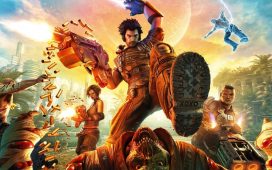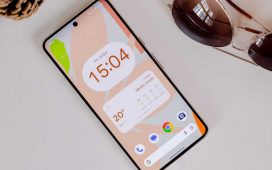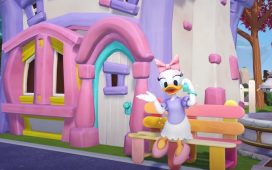The best thing about the Switch port of Crash Team Racing Nitro-Fueled on Switch is that it’s often easy to forget you’re even playing on a handheld. Switch delivers a genuine contender in the search for a definitive release of this remake: you get a 30fps kart racer with every track included – just like PS4 and Xbox One – along with the option to play on the go. Of course, there are cutbacks in current-gen comparisons – most noticeable when playing docked – but this is an accomplished port nonetheless.
First, off cramming the entire game into a 6GB install is no small feat. Next to the 16GB used on PlayStation 4, it’s not the most extreme case of downsizing we’ve seen, but it’s worth touching on why there’s a difference at all. As always, movie files within the install are a prime area of compromise. To trim the install size down, the quality of pre-encoded videos are dropped on Switch, mainly affecting the campaign mode with more obvious compression artefacts. Generally speaking, the port gets away with it – if partly due to the fact that the mobile screen hides most of the compromise. It’s a different ballgame on the big screen of course, but these scenes are rare enough it doesn’t hamper the experience too greatly.
First impressions are great otherwise and feature-wise everything’s included from PS4 and Xbox One. Every track is accounted for, including the remakes of the PS2-era Crash tracks. The menus are slick and everything flows beautifully, plus you get a choice between the original and remastered soundtrack in the options, with similar quality to the other console builds. Certainly, the music doesn’t show heavy signs of low bitrate encoding, unlike recent Switch ports like Assassin’s Creed 3. The only weak point that sticks out is the sound effects quality on selecting an option, but elsewhere Switch delivers the goods.
The 1080p/720p docked/mobile configuration of Mario Kart 8 is sadly beyond the remit of Crash Team Racing on Switch, and the game instead runs at native 720p when docked. Target frame-rate is 30fps too, which is another major knock when compared to MK8’s 60fps. Then again, Nitro-Fueled has different priorities, with a focus on visual extras. Per object and full motion blur, plus ambient occlusion, feature on Switch – neither of which make the cut in Mario Kart. In terms of presentation, Crash has a more CG film-like appearance with these layered on, but there’s no overlooking the fact that, as a trade against 60fps, playback simply isn’t as smooth.
The Switch port of Crash Team Racing Nitro-Fueled is impressive – check it out in action here up against other current-gen consoles.
There is a twist on the 720p30 set-up. The bedrock of any great kart racer is its multiplayer, and Nitro-Fueled channels the spirit of the PlayStation original with some excellent split-screen support. Even on Switch, we have parity with every other console: it’s 30 frames per second all round, but to achieve this, further tweaks are made to resolution. The two player split-screen keeps the game rendering at 720p, but four-player gaming while docked incurs a res hit, at 1024×576 – which does stick out somewhat. That only gives each player a 512×288 window to work with, and the action starts to become harder to process. It’s bearable, but it’s also the biggest cutback I can see next to the PS4 or Xbox One versions of the game.
Portable play has a different setup entirely. No matter what mode you select, the game renders at 854×480, even with a two player split-screen game on the go. Meanwhile, we can’t see how Switch copes with anything higher because four-player support is disabled while portable. It’s understandable: dividing a six-inch screen between so many players would have involved another drop in resolution, and given the tiny screen size, the result would likely have been less practical. Either way, running at 854×480 isn’t the best turn-out, but it’s still plenty of pixel detail to serve one or two players.
Differences between docked and portable play are few and far between. Besides dropping from 720p to 480p, there’s only one other change: shadow quality. You’ll notice that the shadows lining the hub world and the Crash Cove starting grid are softer in the distance. The textures, effects and every other aspect of the game stay intact either way, but this is the only standout change. So if you can cope with the extra pixel shimmer and slightly softer shadows, it’s still a great way to enjoy the game on the move.
The big screen experience obviously suffers compared to the other four consoles, certainly in terms of texture detail. Even looking at the in-engine tutorial at the start, you can see that texture resolution on the ground and background rocks is cut down, while the tessellation effect on the ground is gone too. Surprisingly, these cut-backs never stands out while racing, with the motion blur disguising so much of the normal map detailing. Clearly, the 3.5GB of reported memory available to developers on Switch is a factor, and yes, texture pack size has been reduced.
Perhaps the more stark change is the cuts in environment detail. This isn’t a simple matter of draw distance; entire chunks of plantlife are removed outright, making the campaign hub and Crash Cove appear more barren. Similarly, there are tweaks to parts of the geometry, but fundamentally the Switch version keeps every other element.
If all of these cutbacks sound aggressive, they’re nicely covered up in motion. If you can ignore the 720p resolution, it honestly holds its own. In fact, the most intrusive aspect of the port isn’t down to the graphics at all. Loading times on the Switch version are longer than any other system – with the handheld often requiring up to 14 seconds more than the other consoles in loading up a track.
Our first look at CTR running on PS4, Xbox One and the enhanced consoles – it may be 30fps across the board, but it’s still an exceptionally fun ride.
Switch ports often fail to hit the standard set by the other consoles in terms of performance – a factor of the low-power mobile chipset – but every stage I’ve tried in single-player mode runs at a stable 30fps a majority of the time. It’s fully v-synced, so should it drop, you won’t get any tearing – unlike the Xbox One consoles. The only snag is that frame-pacing at 30fps is uneven, but the spikes to 16ms are very irregular. There’s more to play, but I’ve run through almost every track by this point, and can safely say I came away very impressed.
Docked or portable, Switch nails it here, but that does depend on playing in typical races. Those fortunes change when moving to the more taxing battle mode, maxed out with all AI karts. Bizarrely, there are frame-rate dips here but only while Switch is docked. So expect drops to 27fps in the Rampage Ruins stage, with just one player on-screen. Using the same stage once again in portable mode, Switch fares better; it’s 30fps locked all the way through some intensive battling. Given the resolution drops to 480p here, it’s possible there’s more of a GPU overhead to cater for these bursts of alpha effects. The smoother way to play this mode is away from the TV then, but overall, it’s still very playable docked too.
Split-screen play is also surprisingly robust from what I’ve tested. Docking the Switch and running with four players, the res drop to 1024×576 seems to be enough to preempt major frame-rate lurches. Battle mode or otherwise, I’ve yet to find anything below 30fps. So far so good; It’s much the same story in portable mode with two players, and restricting mobile play to just two camera views helps massively in avoiding drops under 30fps.
Everything considered it’s hard not to be impressed by Nitro-Fueled on Switch. It’s a feature complete edition, running at the same 30fps target as PS4 and Xbox One and largely hitting it. Resolution and visual settings take a hit, but in solo play it holds up surprisingly well. The only negatives? You will see image quality degrade in four player action and you can also expect gameplay to drop below 30fps in certain modes too – notably the battle mode. However, all-round this package is well tailored to the system. Crash Team Racing is another credit to the Switch’s flexibility – and for me, it’s an easy one to recommend.














